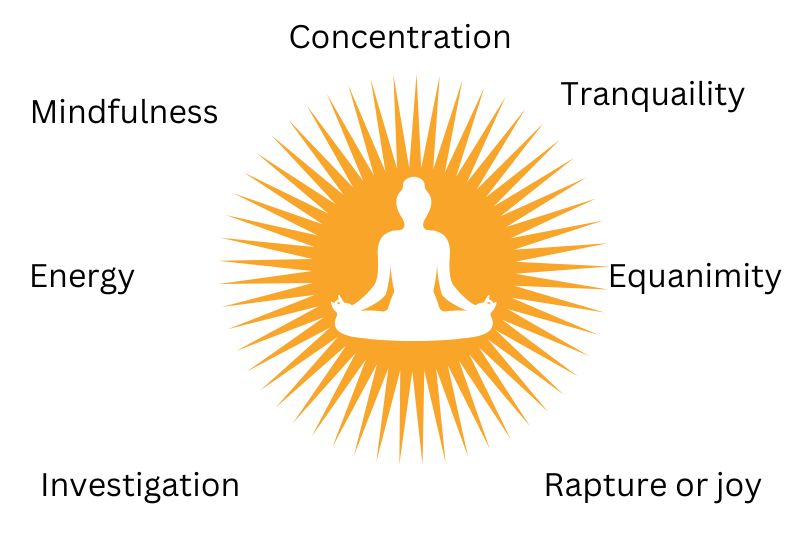The basic beginning and conclusion of the Buddhist religion is the liberation from suffering. Buddhist followers follow the practices set by the founder of their religion, and they are considered the most important ones. Buddha’s basic teachings are
- The Three Universal Truths
- The Four Noble Truths
- The Noble Eightfold Path
Seven Enlightenment Factors
In the Buddhist tradition, The Noble Eightfold Path consists of 8 different teachings and practices that help attain and realize enlightenment. And in this list, mindfulness is at seven number.
This mindfulness is the central point and linking factor of the seven factors of awakening and is only attained by knowing, understanding, and practicing all the 7 factors of enlightenment. Once a person attains mindfulness, he can cover all the paths of the Noble Eightfold path and can finally attain and realize enlightenment.
Seven Factors Of Enlightenment
What are the 7 factors of enlightenment? Let’s discuss the topic in detail, but before that, it’s better to understand the term from different viewpoints.

Enlightenment and World
When the term enlightenment appears in front of the eyes, many aspects related to this particular term appear simultaneously. On a larger scale, the enlightenment is just a period or concept for the people of literature or Christianity. However, the concept has had a profound effect on the thinking of many Christians.
People mostly know about the European enlightenment, which is a ‘logical thinking’ based concept where all the concepts come and are proved by pure sciences.
But on the contrary, the religion Islam has a different concept of enlightenment. However, it is also based on logical reasoning, in addition to natural laws and religion, which combined with the belief in the oneness of Allah.
When it comes to Hinduism, enlightenment has a similar concept to Buddhism, but they called it ‘moksha,’ which, in simple words, means becoming one with Brahman. However, despite the similarity, the way of achieving enlightenment differs in both religions.
Where Do The Factors Of Buddhist Awakening Come From?
The 7 factors of awakening are seven inner human or mental capacities that a person has less realization of or can’t utilize properly. Buddhists call it “inner wealth,” but in actuality, it’s not about cultivating new abilities; instead, it is the process and struggles to identify the previous ones which a person holds, appreciate them and strengthen them to live a better life.
The ‘seven factors of awakening’ concept come from Satipatthāna Sutta, a text from the Pali canon of Theravada Buddhism.
In Buddhism, the enlightenment teachings are important for a meaningful life, but in addition, overall, every religion and study tells people that becoming mindful, aware of your presence and your surrounding, and finding the meaning of your life is important for a successful and satisfactory life.
7 Factors Of Enlightenment
The seven factors of awakening in Buddhism are further divided into three categories of factors.
Arousing Factors
- Effort
- Investigation
- Joy
Stabilizing Factors
- Concentration
- Tranquility
- Equanimity
Central Point
Mindfulness: the common link between all factors.
Here finally, we are going to start our main topic, the 7 teachings of buddha or the seven factors of enlightenment. We discuss all of them in detail.
Mindfulness
Mindfulness is the awakening of the mind, which is when a person is fully aware of his surroundings. It provides great help to a person in the identification and separation of a physical and emotional sensation.
According to Buddhism, mindfulness is the presence of the mind in the present moment, when it is not lost in any kind of daydreaming, anticipation, indulging in any thought, or keep worrying about anything.
Many mindfulness techniques, like noting, can help keep us away from distractions. It enhances self-awareness and puts light on our habits, emotions, thinking, and mental abilities or qualities. Thus, this helps a person shape his mind and intentionally change his brain activities, called self-directed neuroplasticity.
Investigation
An investigation is an urge to seek the truth; it is the ability to clearly distinguish all the aspects of things happening in the present moment. As a part of Buddhist meditation practice, an investigation is used to find dhamma, a Pali term that means truth.
According to Buddhism, the investigation is finding the truth about natural law and the nature of existence. It tells a person not to have faith blindly in everything but instead investigate to find out the truth behind it.
Suppose a person wants to become aware of the moment in which his mind and body are present. In that case, he should pay attention to a constant investigation because a careless attitude and distractions are the biggest hindrances in the path of gaining mindfulness and awakening.
Energy
Every action needs energy, whether observing, investigating, or doing anything. Having energy requires putting your whole focus and attention on the work at hand. The term “effort” refers to the expenditure of both physical energy and mental focus in order to finish a project or undertaking, and it’s very usual for individuals to put in this kind of work without being quite aware of what they’re doing.
Awakening is a factor that occurs at this level because energy comes more readily after we have taken the time to examine and arrange our ideas. And this explains why awakening occurs at this stage.
Suppose at a time you get suddenly demotivated and tell yourself that you will not do meditation further than what’s next. Your whole energy has been drained out, and now you can’t understand what to do to return that energy.
At this point, your own thought patterns, logical reasoning, and observation help you. Start finding the reason behind your mindfulness meditation practice. It’s possible that you desire to lessen the mental anguish you experience, get a deeper comprehension of how the mind functions, or improve the mental equilibrium of both yourself and others around you. They shape our perceptions of exertion and dynamism.
Joy or Rapture
The reasons in the last part motivate you to do mindfulness meditation exercises, but what will happen next? After a successful meditation, when you find out that the reasons behind the practice are now fulfilled, you feel real happiness and joy, awakening the mind.
By utilizing the technique of self-directed neuroplasticity, you will shape your mind, think more positively, and achieve happiness. According to Buddhism, happiness is not what we believe or get readymade; instead, it results from our actions and the things we do and achieve.
Thus, instead of going for cravings that only bring suffering, a person chooses to find real happiness that brings mental peace with it.

Tranquillity
The presence of serenity or tranquillity in both the body and the mind is the fifth factor. The contentment that one derives from experiencing joy, happiness, ecstasy, or pleasure may pave the way for a mind that is really at ease. This component is more akin to the satisfaction felt by a person who has completed his or her job for the day and is now taking some time off to relax, in contrast to the exuberant enjoyment that was the focus of the prior elements of enlightenment.
In the same way, that pleasure cannot be generated or created, so can tranquility. Conceivably, it emerges as a result of the other factors of enlightenment.
In order to cultivate mental calm and equilibrium, practice meditation that involves bringing oneself into contact with one’s bodily sensations, emotions, ideas, and sentiments. You will reach a point when such feelings of greater serenity become more frequent and normal, and at that particular point, you will activate the 5th element of enlightenment.
Concentration
Concentration is always an important part of all types of meditation. It is also the eighth component of The Noble Eightfold Path of Buddhism. While meditation, a person needs to focus or concentrate on something like a breath or mantra.
But in the case of mindfulness, it is making focus or concentrating on whatever you are doing at that particular present moment. Thus, it helps you avoid distractions and keep your mind from diverting toward unrelated thoughts and concerns.
While in the case of deep mindfulness meditation and tranquillity, keeping yourself concentrated will be your biggest challenge. This aspect of awakening is not about meditating on a particular physical or mental object; rather, it is about achieving “momentary concentration” on each experience as soon as it presents itself, rather than concentrating on a single object of meditation.
Equanimity
Though misunderstood, this term holds a special place in the 7 factors of enlightenment. Equanimity, in its purest form, refers to the capacity to keep one’s cool, one’s composure, and one’s relaxation in a range of situations, regardless of how tough or unpleasant they may be.
A lack of struggle or a feeling of effortlessness may be associated with equanimity, which can be achieved through developing our capacity to focus and stay calm. And this will frequently bring us naturally towards more equanimity.
Maintaining composure in the face of adversity makes us less anxious about anxiety, more at ease with worry, and more resistant to anger. Thus, it makes you more aware of your present situation and surrounding happenings, less reactive toward negative thoughts, and achieving mindfulness.
My Verdict On 7 Factors Of Enlightenment
Though the 7 factors of enlightenment are Buddhist teachings, in every religion, enlightenment holds a special place. Enlightenment and awakening of the mind are important for living a peaceful and calm life, with a higher opportunity to achieve success and happiness.
















